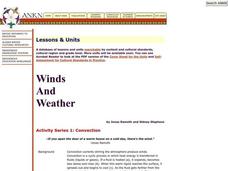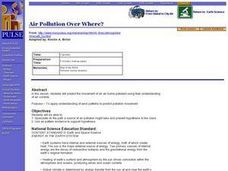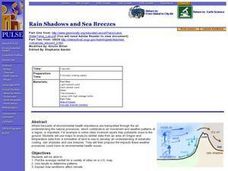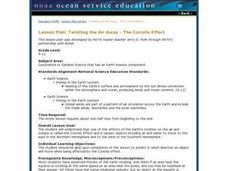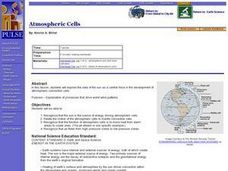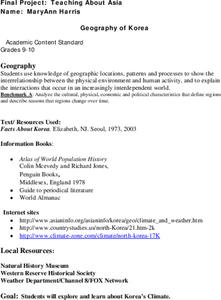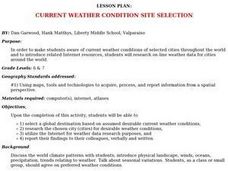Curated OER
Fallout!
Students plot the locations of fallout from two disasters that polluted much of the world's air. They plot the ash fallout from the 1980 Mt. St. Helen's eruption to see what the wind patterns in the United States look like overall. Next...
Curated OER
Earth's Winds, Crust, and Atmosphere
This site provides a variety of activities and worksheets about the problem-based learning activity about Earth and its atmosphere. The lessons can be used separately or together in a geology unit. The resources and charts are very...
Curated OER
Convection
Students experiment with the cyclic process of convection and apply the principal to everyday events.
Chicago Botanic Garden
Climate Change Around the World
It is unknown if cloud cover increases in response to carbon dioxide levels changing, helping climate change slow down, or if cloud cover decreases, allowing Earth to warm faster. Part four in the series of five lessons has classes...
Curated OER
Finding the Way
Young scholars identify and research navigational tools used in deep sea explorations. They are introduced to a compass, the Global Positioning System and sonar technology and then describe their uses in underwater exploration.
Curated OER
Air Pollution Over Where?
Young scholars predict the movement of an air borne pollutant using their understanding of air currents. They determine which governments and/or communities should be contacted to be forewarned. They also explore the properties of their...
Curated OER
You Can Die Here
Students examine Death Valley including the amount of precipitation and winds that it gets. In this climate based lesson students explain the reasons for the amount of precipitation and windward patterns in Death Valley.
Curated OER
Ocean Currents and Sea Surface Temperature
Students use satellite data to explore sea surface temperature. They explore the relationship between the rotation of the Earth, the path of ocean current and air pressure centers. After studying maps of sea surface temperature and ocean...
Curated OER
Rain Shadows and Sea Breezes
Students plot the average rainfall for a variety of cities in the United States. Using the map, they work together to determine patterns on which toxicants are transported through the air. They determine the impacts of various weather...
Curated OER
Weather Analysis - Lab Activity
Ninth graders perform research in the subject of weather to answer several key questions to increase comprehension of concepts. Students use weather prediction as an application for the research.
California Academy of Science
Climate Change Impacts
Getting kids thinking about climate change now, will hopefully push them into action when they become adults. Young environmentalists discuss the evidence and causes of climate change seen in the state of California. They brainstorm ways...
Curated OER
Build the Tallest Building
Learners examine the design and construction of skyscrapers. They use the internet to research information about different types of skyscrapers. They create their own building and defend it to the class.
Curated OER
The Search for El Nino
Sixth graders complete an El Nino scavenger hunt. In this earth science activity, 6th graders describe the conditions that create El Nino and compare it to normal condition. They discuss how this phenomenon affects marine ecosystem.
Chicago Botanic Garden
Climate Change Around the World
You know climate change is happening when you see a bee take off its yellow jacket. Part four in a series of five lessons explores all factors affecting climate change: temperature, cloud cover, precipitation, and carbon dioxide. By...
NOAA
Why Should I Care?: Show How Increased Carbon Dioxide Makes the Ocean More Acidic
How does a change in pH affect the ocean ecosystem? Scholars explore the idea by making an acid-base indicator in part seven of the 10-installment Discover Your Changing World series. First, they explore impacts of carbon dioxide in...
Curated OER
Twisting the Air Away - The Coriolis Effect
Students examine the Coriolis Effect and its effects on the different hemispheres. For this Earth science lesson students divide into groups to they make predictions. Students then complete an activity to explore movement as it relates...
Curated OER
Atmospheric Cells
Learners recognize that the sun is the source of energy driving atmosphere cells. They relate the motion of the atmospheric cells to mantle convection cells. Students recognize that the function of atmospheric cells is to move heat from...
Curated OER
Geographic Effects on Precipitation, Water Vapor and Temperature
Students investigate the factors affecting climate using Live Access Server. In this geography lesson, students graph atmospheric data using Excel spreadsheet. They compare and contrast temperature, precipitation and water vapor of two...
Curated OER
Meteorological Predictions
Students make a link between prediction and hypothesis in math and science. Based on data collected over one week, students evaluate the predictions of local weather forecasters, compare the predicted outcomes to the actual weather...
Curated OER
Chasing El Nino
In this El Nino learning exercise, students review this specific change in the climate cycle by completing 20 short answer questions.
Curated OER
Geography of Korea
Students are introduced to the geography of Korea. Using the internet, they identify the weather and climate in the country and create a week weather chart for Korea's four seasons. They complete an interview with a local weatherman...
Curated OER
Current Weather Condition Site Selection
Students work together to agree on the days "preferred weather conditions." They choose a city in the world they think will have the preferred current weather conditions.
NASA
Nasa: Global Wind Patterns
This site from NASA lists and defines global wind patterns. It features a graphic of these patterns and a self-test with answers.




